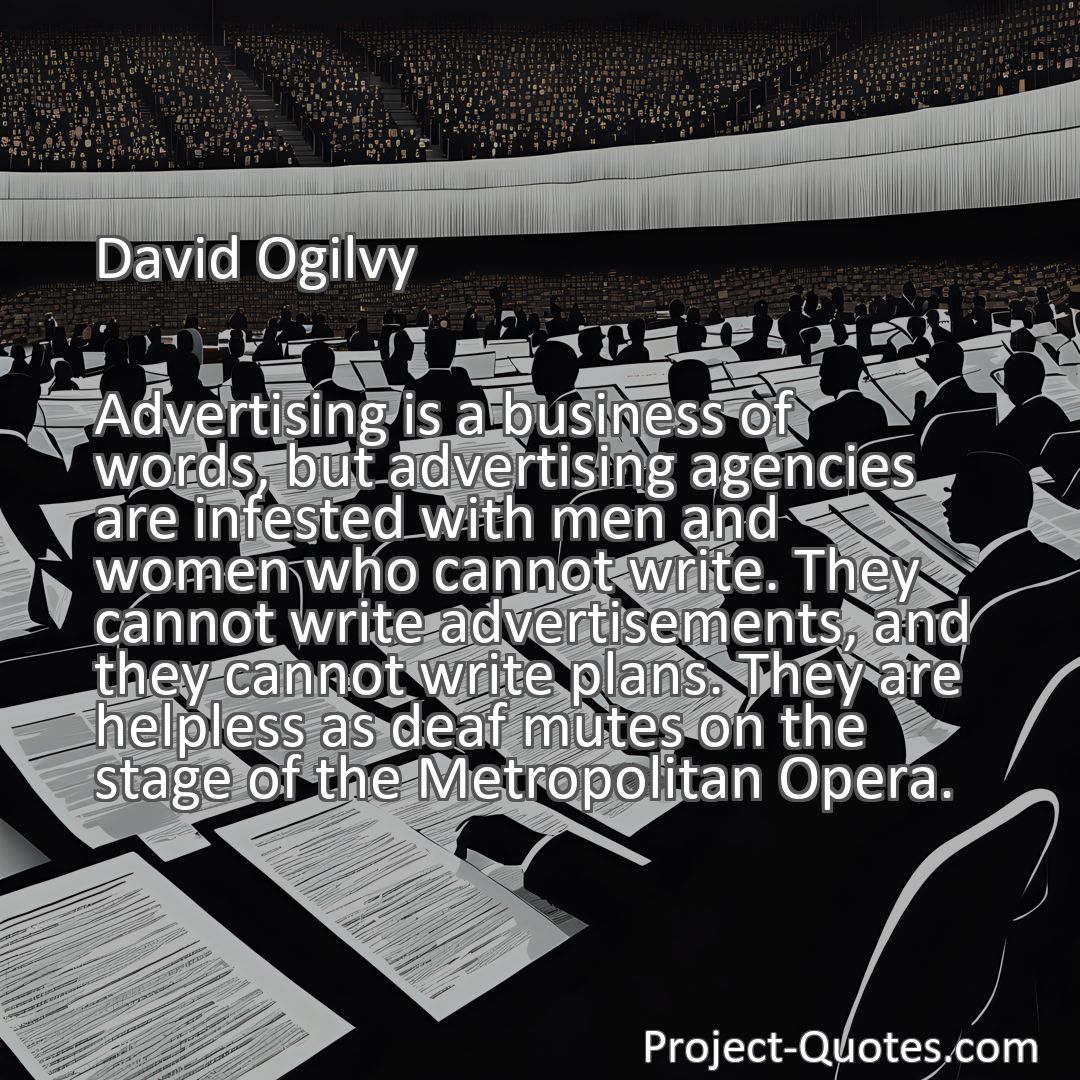Advertising is a business of words, but advertising agencies are infested with men and women who cannot write. They cannot write advertisements, and they cannot write plans. They are helpless as deaf mutes on the stage of the Metropolitan Opera.
David Ogilvy
to create compelling and persuasive advertisements that resonate with audiences, ultimately driving them to take action. Without strong writing skills, the true potential of a product or service may never be realized, resulting in missed opportunities and underwhelming campaigns. By prioritizing writing proficiency and investing in training and development, advertising agencies can ensure they have a talented pool of writers who can effectively wield the power of words.
Table of Contents
- 1 Advertising is a business of words, but advertising agencies are infested with men and women who cannot write. They cannot write advertisements, and they cannot write plans. They are helpless as deaf mutes on the stage of the Metropolitan Opera.
- 2 David Ogilvy
- 3 Meaning of Quote – Advertising is a business of words, but advertising agencies are infested with men and women who cannot write. They cannot write advertisements, and they cannot write plans. They are helpless as deaf mutes on the stage of the Metropolitan Opera.
- 4 Freely Shareable Quote Image
- 5 Related
Meaning of Quote – Advertising is a business of words, but advertising agencies are infested with men and women who cannot write. They cannot write advertisements, and they cannot write plans. They are helpless as deaf mutes on the stage of the Metropolitan Opera.
In the world of advertising, words are everything. They have the power to inform, persuade, and captivate an audience. However, it is a rather ironic and unfortunate fact that many advertising agencies are filled with individuals who lack the ability to effectively wield these words. David Ogilvy, a renowned advertising executive, once noted that these men and women are like helpless deaf mutes on the stage of the Metropolitan Opera. Let’s dive deeper into this thought and explore why the skill of writing is so crucial in the advertising industry.
When it comes to creating effective advertisements, being able to write is a fundamental skill. Advertising is essentially a form of storytelling, and without the ability to convey a compelling narrative, the message can easily get lost in a sea of noise. Imagine watching a movie with actors who stumble over their lines or a book filled with grammatical errors and confusing sentences. It would be a frustrating experience, making it difficult to fully understand and appreciate the story. The same applies to advertising.
Advertisements are often the primary means through which companies communicate with their target audience. Whether it’s a television commercial, a billboard, or a social media post, these messages need to be concise, engaging, and persuasive. Without skilled writers, the true potential of a product or service may never be realized, resulting in missed opportunities and underwhelming campaigns.
Moreover, writing strong advertising plans is equally essential. These plans outline the strategic approach that agencies take to ensure the success of their campaigns. A well-written plan provides a roadmap for all involved parties, including the client, creative team, and media specialists, to understand the objectives, target audience, messaging, and distribution channels. It is the glue that holds an advertising campaign together.
However, as Ogilvy pointed out, many individuals in advertising agencies struggle to produce effective advertisements or plans. This raises the question: Why does this discrepancy exist?
One possible explanation is that the advertising industry often values other skills over writing proficiency. Creative ideas, visual design, and technological savvy are highly sought after, often overshadowing the importance of clear and persuasive writing. While these skills are undoubtedly crucial in creating visually appealing and innovative campaigns, the power of words should never be underestimated.
Another factor contributing to this issue may be the lack of emphasis on writing in many educational systems. With the rise of digital media and communication platforms, the way we communicate has evolved dramatically. Quick and informal messaging has become the norm, and as a result, writing skills may not be developed as thoroughly as they once were. Many individuals may struggle to articulate their thoughts succinctly and effectively, making it difficult to write impactful advertisements or plans.
Additionally, the fast-paced nature of the advertising industry, characterized by tight deadlines and high-pressure environments, may also contribute to the prevalence of subpar writing. In such circumstances, the focus tends to be on meeting deadlines rather than nurturing the craft of writing. This mindset can hinder the development of strong writing skills and perpetuate a cycle of inadequate communication within advertising agencies.
However, despite these challenges, the value of writing in advertising should not be dismissed. An effective advertisement doesn’t just convey information; it evokes emotions, tells a story, and ultimately persuades the audience to take action. To achieve this, the written content needs to be compelling, well-crafted, and tailored to the target audience. Skilled writers have the ability to capture the essence of a brand and create messages that resonate with consumers, driving them to make purchasing decisions.
Furthermore, well-written advertising plans are fundamental to the success of a campaign. They provide a clear roadmap for all team members involved, ensuring that everyone is aligned with the campaign’s objectives and strategies. Strong writing skills allow advertising professionals to communicate their ideas effectively, facilitating collaboration, and minimizing misunderstandings. A well-written plan also showcases professionalism and attention to detail, instilling confidence in clients and stakeholders.
So, how can advertising agencies address this issue and ensure that they have a talented pool of writers? One solution is to incorporate writing training and development programs into their employee onboarding and continuous education processes. By providing resources and opportunities for growth, agencies can help their employees improve their writing skills and foster a culture of effective communication.
Additionally, agencies can seek out and hire individuals who possess strong writing skills from the start. By prioritizing writing proficiency in the recruitment process, agencies can build a team that is equipped to produce impactful and persuasive advertisements and plans. Collaboration between writers and other creative professionals is also key. By working together, they can ensure that the written content seamlessly integrates with visual elements, enhancing the overall effectiveness of the campaign.
In conclusion, David Ogilvy’s observation that advertising agencies are infested with men and women who cannot write sheds light on a significant issue within the industry. Effective advertising requires the skillful use of words to convey compelling narratives and persuasive messages. By recognizing the importance of writing, investing in training, and hiring talented writers, agencies can transcend the limitations of their current state and elevate their creative output. Only by empowering their employees with strong writing skills can advertising agencies truly thrive in their mission to captivate audiences and drive successful campaigns.
I hope this quote inspired image brings you hope and peace. Share it with someone who needs it today!


